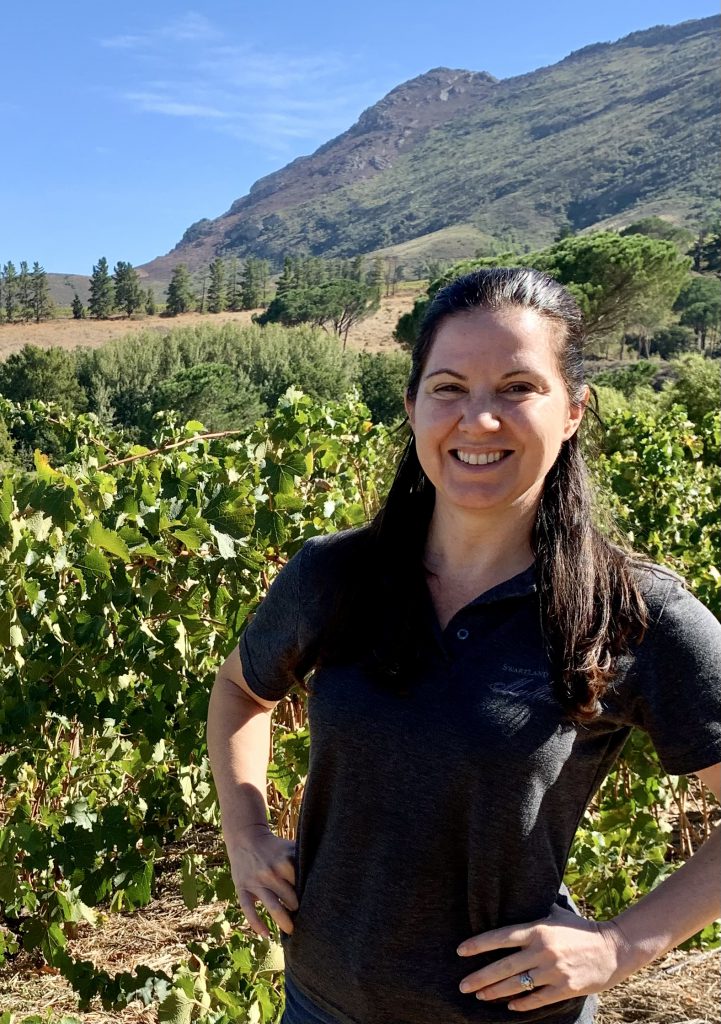Soil Expression in Chenin Blanc: The Granite and Schist Chenin Blancs of Mullineux

Andrea and Chris Mullineux are fascinated with how the diverse soils of the Swartland are expressed in wine. They make Chenin Blanc and Syrah from soils derived from granite, schist, and iron. Since I focused on Chenin Blanc on this year’s visit to the Western Cape, I traveled to their Roundstone estate near Riebeek Kasteel to taste the wines and talk with Andrea about how they reflect their terroir. [Note: This was not our first conversation on this topic. See my earlier article, Mullineux Wines of the Swartland: It’s All About the Soils.]
Many of the soils in the Swartland are decomposed granite. As Andrea explains, granitic soils are sandy and fine grained and absorb winter rains, so vine roots can easily go deep, conducive to a large canopy with larger leaves and less light penetration resulting in high natural acidity and thinner skins. Since the fruit ripens in a cooler micro-environment, the wines are more aromatic. The nutrient-challenged granitic soils result in a longer, slower fermentation.
Schist derived soils on the other hand are hard. Andrea describes them as being like roof tiles, so rainfall skims away. On the other hand, the water that penetrates is retained better than granitic soils. Still the roots of the vines in schist soils are more shallow, resulting in a lighter canopy, more dappled light penetration, and smaller bunches and grapes and thicker skins. Even in the absence of skin contact during fermentation, the high skin to juice ratio produces more phenolics.
Clay soils with high iron content, called koffie klip, are most notable for the weight they give to the mid-palate. Unfortunately, the Mullineux Iron Chenin Blanc was sold out, so I did not taste that wine. However, I did taste other Chenin Blancs grown in koffie clip soil and will report on them in our upcoming Chenin Blanc report.
Also, in an earlier vintage, Andrea and Chris produced a Chenin Blanc grown in a single, 35-year-old vineyard parcel of deep clay with heat reflecting, white quartz rocks that produced intensely flavored, golden berries. I found the 2018 vintage of that wine to be aromatic, ripe and show a soft but concentrated palate.
Differences in soil composition thus affect the vines and their fruit and should affect the wines made from that fruit. To crudely test that hypothesis, Andrea opened the Mullineux Granite and Schist Chenin Blancs, both made the same way, whole cluster pressed, oxidative handling of the juice, fermented with native yeast in old barrels with unstirred lees, and bottled after about 11 months.
The US importer of Mullineux is Skurnik.
The Wines
 Mullineux 2022 Granite Eikelaan Chenin Blanc Swartland 96 The Granite Chenin Blanc is perfumed, sleek, perfectly balanced and ready to drink, or cellar as one prefers. It opens with pure scents of stone fruit and melon mirrored on the palate with lively acidity and just enough grip. A sense of purity, refinement and minerality runs throughout this wine. Eikelaan is a 45-year-old, dry farmed, bush vine vineyard planted in the granitic soils of the Paardeberg. 12.5{83994d7454f8ce68441ea8152244c292227c3db19076e7622c8f5ff92141c35a} alc.
Mullineux 2022 Granite Eikelaan Chenin Blanc Swartland 96 The Granite Chenin Blanc is perfumed, sleek, perfectly balanced and ready to drink, or cellar as one prefers. It opens with pure scents of stone fruit and melon mirrored on the palate with lively acidity and just enough grip. A sense of purity, refinement and minerality runs throughout this wine. Eikelaan is a 45-year-old, dry farmed, bush vine vineyard planted in the granitic soils of the Paardeberg. 12.5{83994d7454f8ce68441ea8152244c292227c3db19076e7622c8f5ff92141c35a} alc.
 Mullineux 2022 Chenin Blanc Schist Swartland 94 While the Chenin Blanc Granite is perfectly ready to drink now, the Schist needs more time to settle down and round out. Its bouquet evokes dusty minerals and the skins of stone fruit, while the palate is gutsy and chewy with pear, melon and quince flavors along with a firm grip. Rich extract shows on the finish. Sourced from vines planted on the shallow (1-1.5’) schist over hard slate soils of the Kasteelberg in 2014. 13.5{83994d7454f8ce68441ea8152244c292227c3db19076e7622c8f5ff92141c35a} alc.
Mullineux 2022 Chenin Blanc Schist Swartland 94 While the Chenin Blanc Granite is perfectly ready to drink now, the Schist needs more time to settle down and round out. Its bouquet evokes dusty minerals and the skins of stone fruit, while the palate is gutsy and chewy with pear, melon and quince flavors along with a firm grip. Rich extract shows on the finish. Sourced from vines planted on the shallow (1-1.5’) schist over hard slate soils of the Kasteelberg in 2014. 13.5{83994d7454f8ce68441ea8152244c292227c3db19076e7622c8f5ff92141c35a} alc.


